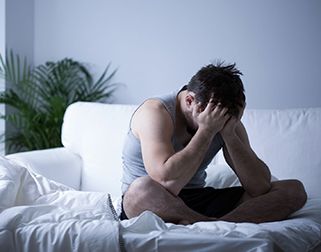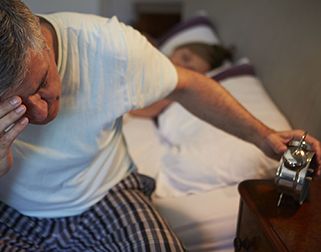Stress and anxiety are normal body responses when facing imminent or perceived danger. They generate the activation required to cope with these dangers or threats and seek solutions. However, a problem occurs when they become too intense or disproportionate to the stimulus that precipitated them, too long lasting (once the danger or challenge is gone or due to an inability to cope), or too frequent. The warning and activation response that is triggered, which aims first and foremost to mobilize resources for survival, is incompatible with sleep. That is why, when these emotions are sustained over time, they end up generating psychophysiological problems, such as insomnia.
Stress and anxiety in sleep

Thus, anxiety and stress become major precipitating factors or triggers of transient insomnia problems.
INSOMNIA CAUSED BY STRESS

Greater physiological and cognitive activation has also been found in people who have a stronger tendency to have transient sleep problems become chronic. Furthermore, once insomnia problems are established, the lack of sleep produces a physiological reaction that increases the levels of anxiety and stress in the organism, causing greater alertness and activation and major difficulty relaxing and therefore falling asleep. The mechanism by which this effect takes place is a cascade of biological events in our body when we are stressed at the hormonal and neuronal level. It produces alterations in the secretion of substances like cortisol, which inhibits and suppresses sleep, as well as prolactin or serotonin, which are closely related to the regulation of the cycles of sleep, mood, perception of pain, etc.
Therefore, we see that anxiety and stress become triggers for insomnia and also consequences of it. They are a fundamental element to be addressed in the treatment of sleep problems.
STRESS INSOMNIA TREATMENT
Throughout life, we are inevitably going to be faced with situations that cause anxiety or stress, such as changes, diseases, problems, and crises. The objective is to adjust the emotions that arise in these situations and act to end these emotions as soon as possible. If sleep problems are what generates stress, it must be dealt with to prevent the problem from becoming chronic.
Addressing these problems requires focus on the most frequent symptoms. In any case, treatment seeks to intervene at the three levels in which anxiety is expressed (thoughts, physical and motor responses):
- With cognitive techniques such as stop thinking, cognitive restructuring, paradoxical intention, auto-instruction, problem solving
- With physiological techniques such as relaxation or physical disabling techniques.
- With motor control techniques such as stimulation, self-control, social skills.
PREVENTION
As prevention, it would be advisable, in order to minimize the risk of these problems, to learn coping strategies for stress as if they were a vaccine or inoculation against it so that when stress arises, we are able to deal with it in a more decisive and efficient manner.
This is done through programs called inoculation to stress, which teach useful life tools such as: time planning, decision making, solution of problems, social skills and assertiveness, relaxation, self-esteem improvement…